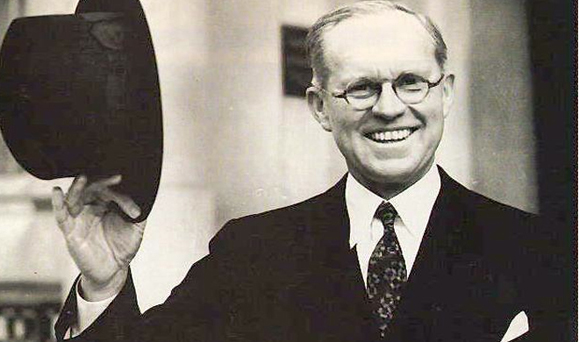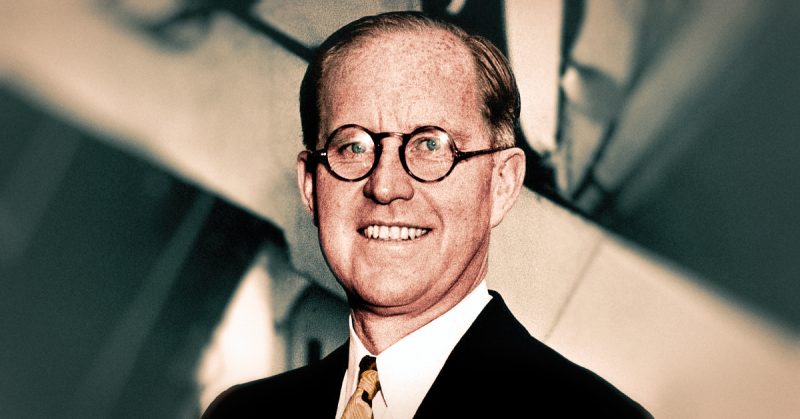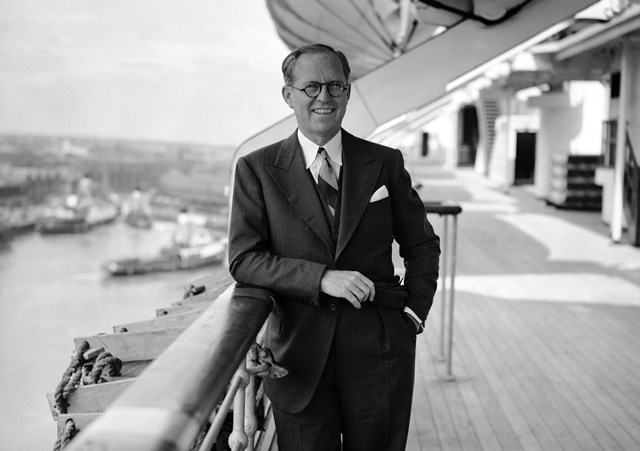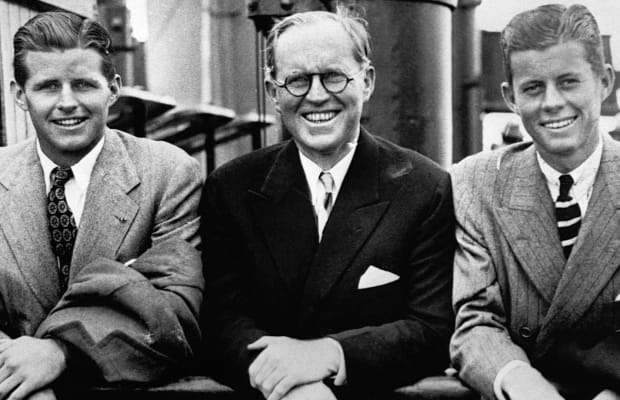Last Updated on January 12, 2023
Many will be familiar with that last name. Joseph Sr. was the patriarch of the popular Kennedy family that even had one of its members as the President of America.
From rags to riches, a scandal to statesmanship, Joseph P. Kennedy’s life is legendary. In 1888, Kennedy was born into a humble Boston family and rose to become one of America’s wealthiest and most powerful men, leaving an indelible mark on the country’s political and cultural landscape.
Kennedy’s life was full of drama, ambition, and controversy, from his early days as a savvy businessman and investor to his later years as a political power broker and Ambassador to the United Kingdom.
Follow the rise of one of America’s most fascinating and polarizing figures as we delve into the incredible story of Joseph P. Kennedy.

Who Was Joseph P. Kennedy?
Joseph Patrick Kennedy was a well-known American politician, businessman, and investor. He is best known as the patriarch of the Kennedy family, one of America’s most powerful and influential families. This family included President John F. Kennedy, Attorney General, and Senator Robert F. Kennedy, and long-serving Senator Edward M. “Ted” Kennedy.
Kennedy was a freckled, active man with horn-rimmed spectacles that gave him an owlish appearance. He became a bank president at the age of 25 and a millionaire by the age of 30. Kennedy became a shipbuilder, a motion-picture tycoon, and a major contributor to the Democratic Party during his life.
His achievements even led many to accuse him of dealing with bootleg liquor during Prohibition. Interestingly, Kennedy mastered stock-exchange manipulation in five years (1919-1924) as manager of the stock division of Hayden, Stone, and Company, an investment-banking firm.
He struck out on his own and became a brilliant plunger in the 1920s bull market. So much on who Joseph Kennedy was, but we take it bit by bit.
Read: History of the United States of America
Joseph P. Kennedy – Childhood and Education
On September 6, 1888, Joseph Patrick Kennedy was born at 151 Meridian Street in East Boston, Massachusetts. Kennedy was the eldest son of businessman and politician Patrick Joseph “P.J.” Kennedy and Mary Augusta (Hickey) Kennedy. Before graduating in 1908, Kennedy attended Boston Latin School, where he thrived in baseball and was elected class president. Kennedy then attended Harvard College, where he was admitted to the prestigious Hasty Pudding Club. After then, he received his bachelor’s degree in economics in 1912.
Kennedy married Rose Fitzgerald On October 7, 1914. She was the eldest daughter of Boston Mayor John F. “Honey Fitz” Fitzgerald and Mary Josephine “Josie” Hannon.

His Budding Business Career
Kennedy went into business and investing at a young age. He was hugely successful as a stock market and commodity investor in his mid to late twenties. Afterward, he reinvested in real estate and a variety of industries. Though he did not start a large company from scratch, his timing as a buyer and seller was impeccable.
Several criminals, including Frank Costello, have claimed to have collaborated with Kennedy in mysterious illegal operations during Prohibition. But scholars have dismissed the claims – even though his father was a whisky importer.
And according to David Nasaw, the most recent and thorough biographer, no credible evidence linking Kennedy to illegal activities has been discovered. His wealth grew to the extent that in 1957, when Fortune magazine published its first list of the richest people in the United States, Kennedy was ranked in the $200-400 million range.
Read: Katherine Johnson: The Black Woman Behind America’s Successful Space Missions
Joseph P. Kennedy and His Early Business Ventures
Kennedy’s first job after graduating from Harvard was as a state-employed bank examiner, where he learned a lot about the banking industry. When the Columbia Trust Bank — in which his father had a significant stake, was threatened with a takeover in 1913, Kennedy reclaimed control by borrowing $45,000 from family and friends (equivalent to about $1.2 million today). Later on, he was appointed president of the bank when he was just 25 years old. Kennedy told the press that he was “America’s youngest” bank president.
Kennedy was a real estate investor who made a tidy profit from his ownership of Old Colony Realty Associates, Inc., which purchased distressed real estate.
Despite his reservations about America’s involvement in the first World War, Kennedy tried to participate in wartime production as the assistant general manager of Fore River — a major Bethlehem Steel shipyard in Quincy, Massachusetts. He was in charge of the production of transports and warships there. Through this job, he met Assistant Secretary of the Navy Franklin Delano Roosevelt.
Subsequent Business Ventures
Kennedy joined the booming stock brokerage firm of Hayden, Stone & Co in 1919. He became an expert in the unregulated stock market of the day. He employed tactics that were later deemed insider trading and market manipulation.
Also, he happened to be on the corner of Wall and Broad Streets on September 16, 1920. This was at the time of the Wall Street bombing and he was thrown to the ground by the force of the blast. A few years later, he founded his investment firm in 1923. And following the 1929 stock market crash, Kennedy became a multi-millionaire by taking “short” positions.
Kennedy made a fortune by reorganizing and refinancing several Hollywood studios. This was because film production in the United States was much more decentralized than it is today. The time saw numerous film studios producing films. Also, at the time, Film Booking Offices of America (FBO) was a small studio that specialized in low-budget Westerns. Its owner was in financial trouble and requested Kennedy’s assistance in finding a new owner. Kennedy then assembled his group of investors and paid $1.5 million for it.
Seizing the opportunity, Kennedy moved to Hollywood in March 1926 to focus on running film studios. At the time, film studios were allowed to own exhibition companies, which were required to get their films shown on local screens. With this in mind, he acquired the Keith-Albee-Orpheum Theaters Corporation (KAO) in a hostile takeover, which had over 700 vaudeville theatres across the United States that had begun showing movies. In March 1927, he merged Pathe Exchange with Cecil B. DeMille’s Producers Distributing Corporation.

Read: How the United States Erased Native Americans From Its History
Controversial Business Dealings
Later on, he tried unsuccessfully to launch First National Pictures in August 1928. In October of the same year, he formally merged his film companies, FBO and KAO, to form Radio-Keith-Orpheum (RKO), making a fortune in the process. Then, eager to acquire the Pantages Theatre chain, which had 63 profitable theatres, Kennedy made an $8 million offer ($126 million today). But, it was rejected. This prompted him to stop distributing his films to Pantages.
Nonetheless, Alexander Pantages still maintained his stand not to sell. After Pantages was later charged and tried for rape, his reputation suffered. Left with no choice, he accepted Kennedy’s revised offer of $3.5 million ($55.2 million today).
Pantages, who claimed Kennedy had “set him up,” was later found not guilty at a retrial. What happened, then? Eunice Pringle, the girl who had accused Pantages of rape, confessed on her deathbed that Kennedy was the mastermind behind the plot to frame Pantages.
Joseph P. Kennedy and His Political Career
In 1932, Joseph P. Kennedy backed Franklin D. Roosevelt’s presidential campaign. This marked his first significant involvement in a national political campaign. He contributed, loaned, and raised a significant amount of money just for the course. In 1934, the Securities and Exchange Commission was established by Congress to put an end to irresponsible market manipulations and the dissemination of false information about securities.
Then, Roosevelt compiled a list of candidates for the SEC chairmanship. After weighing the abilities of the people on the list, Kennedy was named the best bet for Chairman. The decision was made as a result of his executive ability, knowledge of the habits and customs of business to be regulated — and ability to moderate different points of view on the Commission.
Proving himself worthy, Kennedy sought out the best lawyers available, assembling a hard-working team on a reform mission. William O. Douglas and Abe Fortas were among them, and both were later appointed to the Supreme Court.

The Rest of Kennedy’s Political Career
The SEC accomplished its four missions, as Kennedy reassured the American business community that Wall Street would no longer deceive and exploit them. He urged ordinary investors to return to the market and help the economy recover. As investors realized the SEC was protecting their interests, Kennedy’s reforming work as SEC Chairman was widely praised on all sides. In 1935, he resigned from the SEC.
Father Charles Coughlin, an Irish Canadian priest near Detroit, rose to prominence as the most prominent Roman Catholic spokesman on political and financial issues in the 1930s — with a weekly radio audience of millions. Coughlin, who had been a staunch supporter of Roosevelt since 1932, broke with him in 1934. Then, the president became a vehement opponent of Coughlin’s weekly anti-communist, anti-Semitic, far-right, anti-Federal Reserve, and isolationist radio talks. Roosevelt dispatched Kennedy and other prominent Irish Catholics to try to calm Coughlin down.
Throughout the rest of his political career, he served as the chairman of the Securities and Exchange Commission and as the first chairman of the United States Maritime Commission. He also served as the Ambassador to the United Kingdom. There, he was heavily involved in the appeasement policy between UK and Nazi Germany in the lead-up to World War II. This was, however, later heavily criticized by historians.
Despite these early setbacks, Kennedy remained a powerful and influential figure in American politics. His sons John, Robert, and Ted all went on to successful political careers. Joseph P Kennedy passed away in 1969, but his legacy lives on through his descendants and the many causes he supported throughout his life.
What Happened in His Personal Life?
Joseph and Rose Kennedy, his wife, had nine children together. John F. Kennedy (1917-1963) served as a United States senator from Massachusetts (1953-1960) and as the 35th President of the United States (1961-1963), Robert F. Kennedy (1925-1968) served as Attorney General (1961-1964) and as a United States senator from New York (1965-1968), and Edward M. “Ted” Kennedy (1932-2009) served as a United States senator from Massachusetts (1962–2009).
His eldest son, Joseph P. Kennedy Jr. (1915-1944), was groomed for the presidency but died while serving in World War II on a dangerous experimental flight over the English Channel.
Eunice Kennedy Shriver, one of the Kennedys’ daughters, founded the Special Olympics for disabled people, while Jean Kennedy Smith served as US Ambassador to Ireland.
As Kennedy’s business success grew, he and his family maintained residences in Boston, New York City, the Cape Cod peninsula, and Palm Beach.
Kennedy had several extramarital affairs, including with actresses Gloria Swanson and Marlene Dietrichand with his secretary, Janet DesRosiers Fontaine.
Before you go…
Hey, thank you for reading this blog to the end. I hope it was helpful. Let me tell you a little bit about Nicholas Idoko Technologies. We help businesses and companies build an online presence by developing web, mobile, desktop, and blockchain applications.
We also help aspiring software developers and programmers learn the skills they need to have a successful career. Take your first step to becoming a programming boss by joining our Learn To Code academy today!
Be sure to contact us if you need more information or have any questions! We are readily available.











